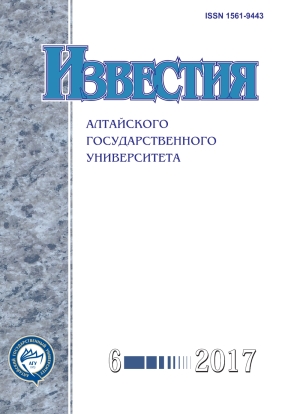On the Issue of Mandatory Application of Professional Standards
Abstract
Federal Law № 122-FZ of May 2, 2015 “On Amendments to the Labor Code of the Russian Federation and Articles 11 and 73 of the Federal Law "On Education in the Russian Federation" introduced significant changes to Chapter 31 of the Labor Code of the Russian Federation. In particular, аrticle 195.1 of the Labor Code of the Russian Federation is stated in a new edition; new аrticles 195.2 and 195.3 have been introduced into the in the Labor Code of the Russian Federation. First of all, the changes have occurred in the definition of the concept of professional standard, fixed in part 2 of аrticle 195.1 of the Labor Code of the Russian Federation. This concept is disclosed in the article. The author has made suggestions on how to improve it. At the same time, the main issue that arises in connection with the introduction of the amendments to the Labor Code of the Russian Federation is how much mandatory the application of professional standards is at present. In the article, based on the analysis of the norms of labor legislation, as well as the explanations contained in the acts of the Ministries of the Russian Federation, examines the following issues: in which cases the use of professional standards is mandatory, and in which cases the employers can continue using qualification guides; about the compulsion of the application of professional standards in state and municipal organizations and other issues.
DOI 10.14258/izvasu(2017)6-12
Downloads
Metrics
References
Трудовой кодекс Российской Федерации от 30.12.2001 № 197-ФЗ (с изм. и доп.) // СЗ РФ. — 2002. — № 1 (ч. 1). — Ст. 3.
О внесении изменений в Трудовой кодекс Российской Федерации и статьи 11 и 73 Федерального закона «Об образовании в Российской Федерации» : Федеральный закон от 02.05.2015 № 122-ФЗ // СЗ РФ. — 2015. — № 18. — Ст. 2625.
Болдырева Н.Б. Изменения в ТК РФ: новое о проф-стандартах // Отдел кадров коммерческой организации. — 2015. — № 6.
Воробьева В. Ставка на профессионалов // ЭЖ-Юрист. — 2016. — № 21.
Об утверждении профессионального стандарта «Специалист в области воспитания» : Приказ Минтруда России от 10.01.2017 № 10н // Официальный интернет-портал правовой информации [Электронный ресурс]. — URL: http://www.pravo.gov.ru, 26.01.2017.
Об утверждении профессионального стандарта «Врач-стоматолог» : Приказ Минтруда России от 10.05.2016 № 227н // Официальный интернет-портал правовой информации [Электронный ресурс]. — URL:http://www.pravo. gov.ru, 06.06.2016.
Об утверждении профессионального стандарта «Врач-педиатр участковый» : Приказ Минтруда России от 27.03.2017 № 306н // Официальный интернет-портал правовой информации [Электронный ресурс]. — URL:http://www.pravo.gov.ru, 18.04.2017.
Ответы на типовые вопросы по применению профессиональных стандартов : Письмо Минтруда России от 04.04.2016 № 14-0/10/В-2253 // Официальные документы в образовании. — 2016. — № 18.
О бухгалтерском учете : Федеральный закон от 06.12.2011 № 402-ФЗ (с изм. и доп.) // СЗ РФ. — 2011. — № 50. — Ст. 7344.
Об утверждении профессионального стандарта «Бухгалтер» : Приказ Минтруда России от 22.12.2014 № 1061н // Официальный интернет-портал правовой информации [Электронный ресурс]. — URL: http://www.pravo. gov.ru, 27.01.2015.
Егоров С.А. Законодательные новации в сфере разработки и применения профессиональных стандартов // Актуальные проблемы российского права. — 2016. — № 4.
О страховых пенсиях : Федеральный закон от 28.12.2013 № 400-ФЗ (с изм. и доп.) // СЗ РФ. — 2013. — № 52 (ч. I). — Ст. 6965.
Об образовании в Российской Федерации : Федеральный закон от 29.12.2012 № 273-ФЗ (с изм. и доп.) // СЗ РФ. — 2012. — № 53 (ч. I). — Ст. 7598.
О рассмотрении обращения : Письмо Минобрнауки России от 12.02.2016 № 09-ПГ-МОН-814 // СПС Консультант Плюс.
Об аудиторской деятельности : Федеральный закон от 30.12.2008 № 307-ФЗ (с изм. и доп.) // СЗ РФ. — 2009. — № 1. — Ст. 15.
О профессиональном стандарте «Аудитор» : Информационное сообщение Минфина России от 16.12.2015 // СПС Консультант Плюс.
Об особенностях применения профессиональных стандартов в части требований, обязательных для применения государственными внебюджетными фондами Российской Федерации, государственными или муниципальными учреждениями, государственными или муниципальными унитарными предприятиями, а также государственными корпорациями, государственными компаниями и хозяйственными обществами, более пятидесяти процентов акций (долей) в уставном капитале которых находится в государственной собственности или муниципальной собственности : Постановление Правительства РФ от 27.06.2016 № 584 // СЗ РФ. — 2016. — № 27 (ч. III). — Ст. 4484.
Copyright (c) 2017 И.А. Прасолова

This work is licensed under a Creative Commons Attribution 4.0 International License.
Izvestiya of Altai State University is a golden publisher, as we allow self-archiving, but most importantly we are fully transparent about your rights.
Authors may present and discuss their findings ahead of publication: at biological or scientific conferences, on preprint servers, in public databases, and in blogs, wikis, tweets, and other informal communication channels.
Izvestiya of Altai State University allows authors to deposit manuscripts (currently under review or those for intended submission to Izvestiya of Altai State University) in non-commercial, pre-print servers such as ArXiv.
Authors who publish with this journal agree to the following terms:
- Authors retain copyright and grant the journal right of first publication with the work simultaneously licensed under a Creative Commons Attribution License (CC BY 4.0) that allows others to share the work with an acknowledgement of the work's authorship and initial publication in this journal.
- Authors are able to enter into separate, additional contractual arrangements for the non-exclusive distribution of the journal's published version of the work (e.g., post it to an institutional repository or publish it in a book), with an acknowledgement of its initial publication in this journal.
- Authors are permitted and encouraged to post their work online (e.g., in institutional repositories or on their website) prior to and during the submission process, as it can lead to productive exchanges, as well as earlier and greater citation of published work (See The Effect of Open Access).








